Can the past help the present? Can the dead save the living?
HUMAN ACTS by Han Kang, translated by Deborah Smith, published by Hogarth, 2017
Welcome to Reading the (Un)Familiar, where Jin curates translated and diasporic literature to encourage us to read beyond the Anglosphere. Jin is currently reading contemporary feminist Korean writers, Asian/diasporic Asian writers, and other writers in translation (loosely defined).
I remember when news broke about South Korean writer Han Kang receiving the 2024 Nobel Prize in Literature “for her intense poetic prose that confronts historical traumas and exposes the fragility of human life.” I can’t remember exactly what I was doing then, but I do vividly remember watching her Nobel Prize lecture live on YouTube on December 7, just days after now-impeached South Korean president Yoon attempted to declare martial law over the country. She gave a talk, in her soft-spoken voice that I do very much love, about what drives her writing, on the throughlines of what she’s written thus far — often about state-sanctioned violence and violent, grief-filled histories that the government would rather forget. (For this reason, her work is banned in certain collections and hated by right-wing extremists.) To hear her speaking after another similarly traumatic national moment that echoed the very history that she writes about in her novels felt like a strange and terrible poem.
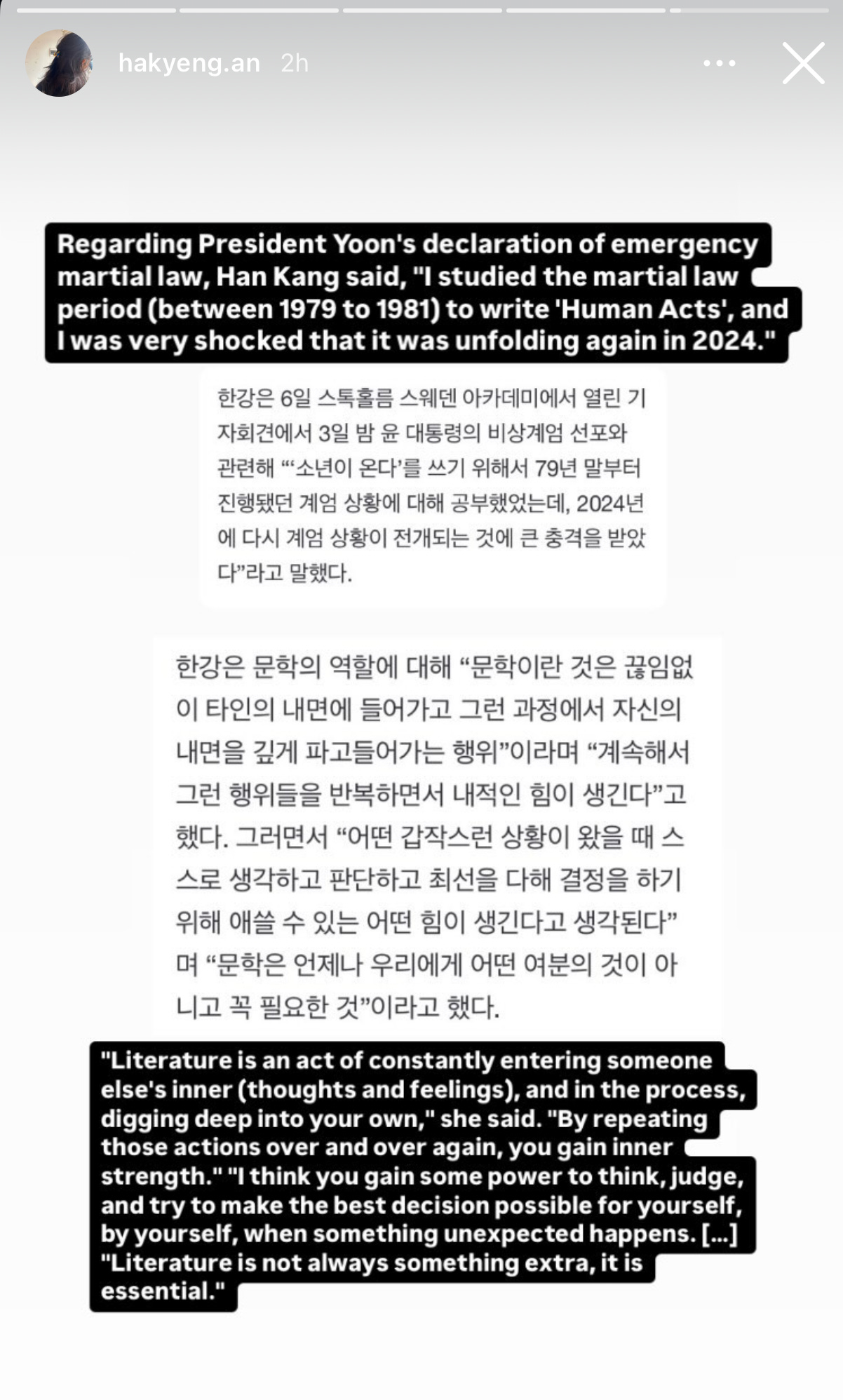
After receiving the news about her Nobel win, Han Kang said she wanted to celebrate by having tea with her son. Speaking of her son, a viral tweet went around not long after with an excerpt from an autobiographical short story Han Kang wrote about why she decided to have a child. Despite the undeniable difficulties of life, she writes, there remains the sweetness of watermelon in the summer, chamoe melon in the spring, the sound of rain, the sight of snow — many wonderful moments of life that would be joys to introduce to a child.
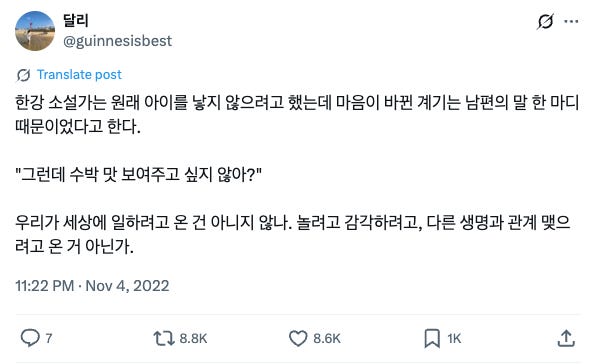

Going back to her Nobel Prize lecture (which, by the way, was just published as a short book in Korean titled Light and Thread): Han Kang shared how each novel she writes is driven by a starting question or two. For Human Acts, she began by grappling with the following questions:
Can the present help the past?
Can the living save the dead?
…but then realized she needed to invert them into:
Can the past help the present?
Can the dead save the living?
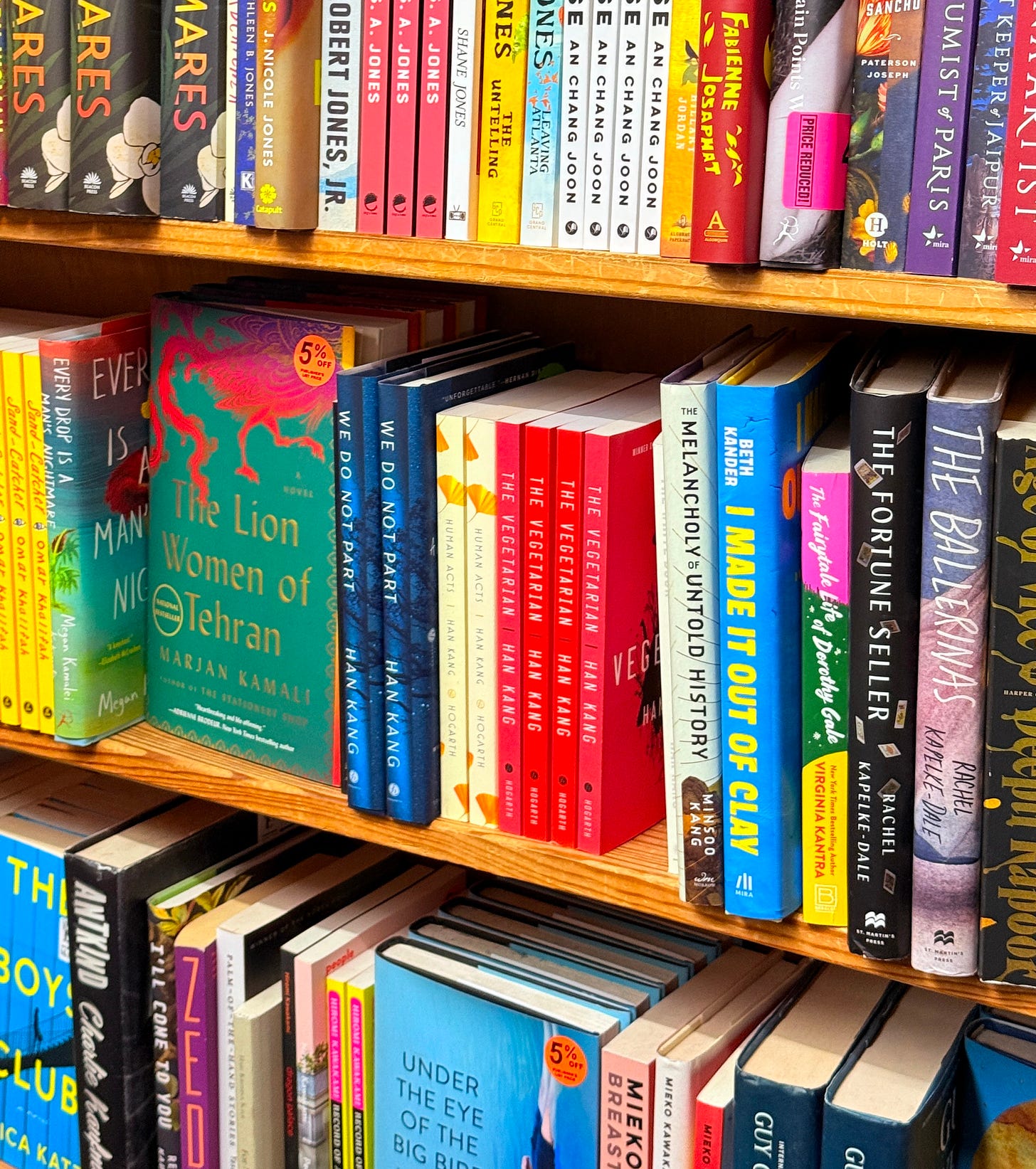
At times, I read words that I realize I will better understand after I have lived a little while longer. I revisited Mary Oliver’s Upstream recently after three or so years of first picking it up, and it felt as if the words had suddenly come alive. After experiencing for myself what it’s like to live in close proximity with the trees and birds and wildness of the green forest, what Mary Oliver describes so vividly is finally clicking into place for me. Similarly, I wonder if the gravity of Han Kang’s questions above will take some time for me to fully realize.
For now, though, I’m interpreting these questions as reasons for us to value and treasure our histories, for us to have the courage to take clear, hard looks at what we have done, what we have committed, and to whom. I visited an exhibit at Glenstone Museum (my favorite museum) by artist Jenny Holzer this past year that felt very Han Kang coded. I always come out of Han Kang’s books reeling, in a bit of a haunted daze, and I felt the same way after this exhibit. Holzer reproduced a set of declassified US government documents from the 2000s on what took place in Iraq and Afghanistan (I encourage you to take a quick look at the exhibition guide here). She didn’t do much else other than simply select a curated set of documents, enlarge and silk-screen them, and hang them up for viewers to slowly read through all the very, very descriptive and terrible text. Some other questions that Han Kang asked herself for Human Acts, I also asked myself at the Holzer exhibit:
How are humans this violent? And yet how is it that they can simultaneously stand opposite such overwhelming violence? What does it mean to belong to the species called human?
To formally introduce today’s recommended book: Human Acts is written by Han Kang, translated by Deborah Smith (who went on to found Tilted Axis Press), published in English by Hogarth in 2017. It mainly centers on the Gwangju Uprising of 1980, a series of student-led protests against martial law in South Korea that were violently suppressed by the dictatorial government at the time. This historical event remains political in Korea, as some extreme right-wing politicians deny that this massacre ever happened. Later, it was also revealed that the U.S. had a part to play in this history.
Han Kang has also written many other renowned books — The Vegetarian, Greek Lessons, The White Book, and We Do Not Part — but my favorite still remains Human Acts for how vivid and emotional of an impact it had on me, and how clearly and terribly she illustrates human suffering on both a macro and micro scale.
For anyone new to Han Kang, I recommend to begin with Human Acts. I need to reread The Vegetarian, but when I first read it back in 2019, it felt like a high-concept art film that went straight over my head — I’d recommend this after one has gotten acclimated to the Han Kang writing style. We Do Not Part is slow (in a good way) and haunting, also a good place to begin, perhaps after Human Acts.
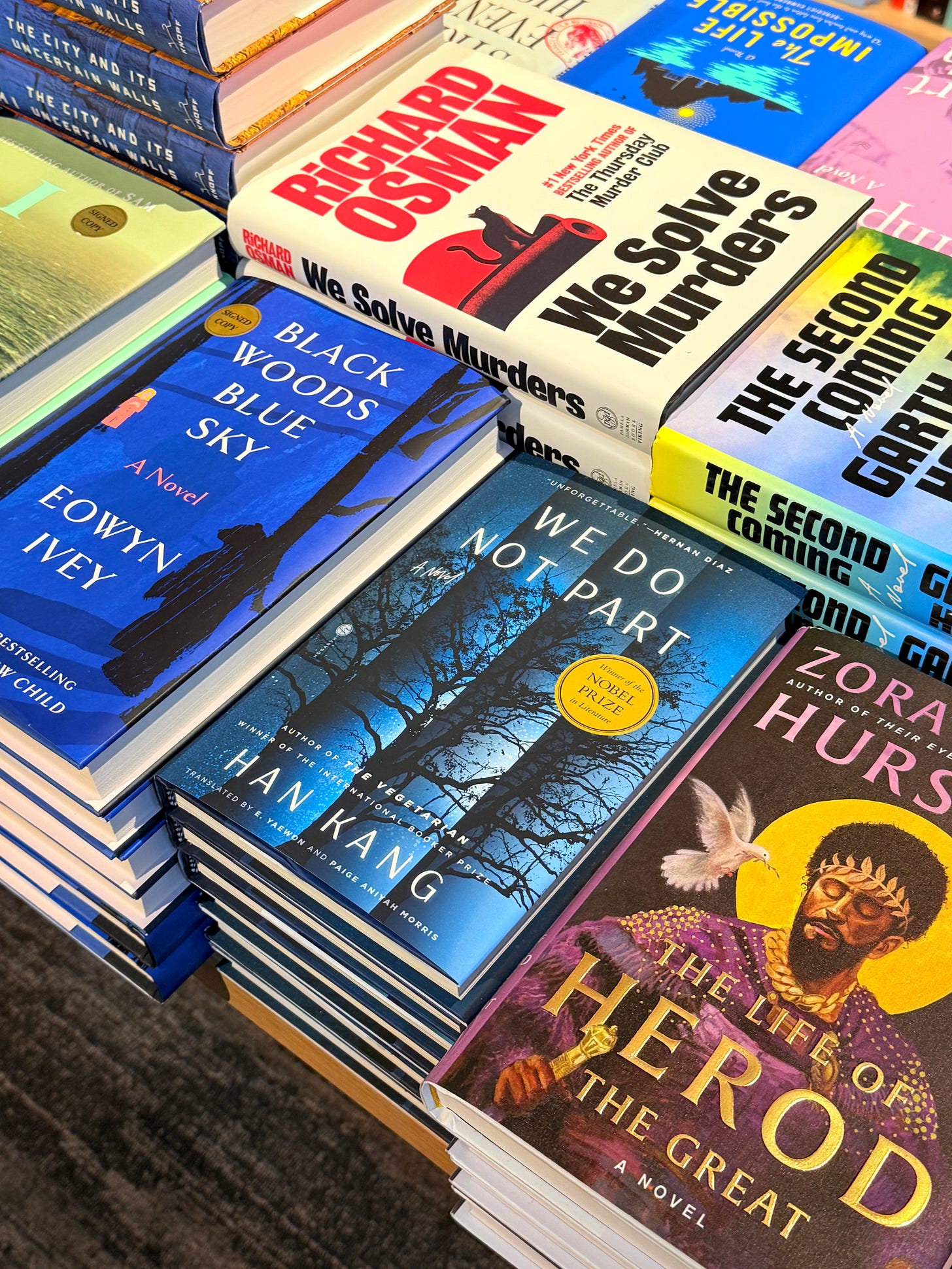
I’d love to hear your thoughts. What do you make of her questions, “Can the past help the present? Can the dead save the living?” or “How are humans this violent? And yet how is it that they can simultaneously stand opposite such overwhelming violence? What does it mean to belong to the species called human?” What is the role of literature in creating a shared public memory of such historical traumas? If you’ve read her work, what’s your favorite book and why? If not, is there a similar author or book that comes to mind?
Thank you as always for taking the time to read. Until next time,
Jin

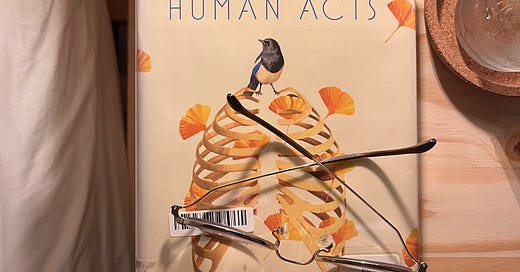


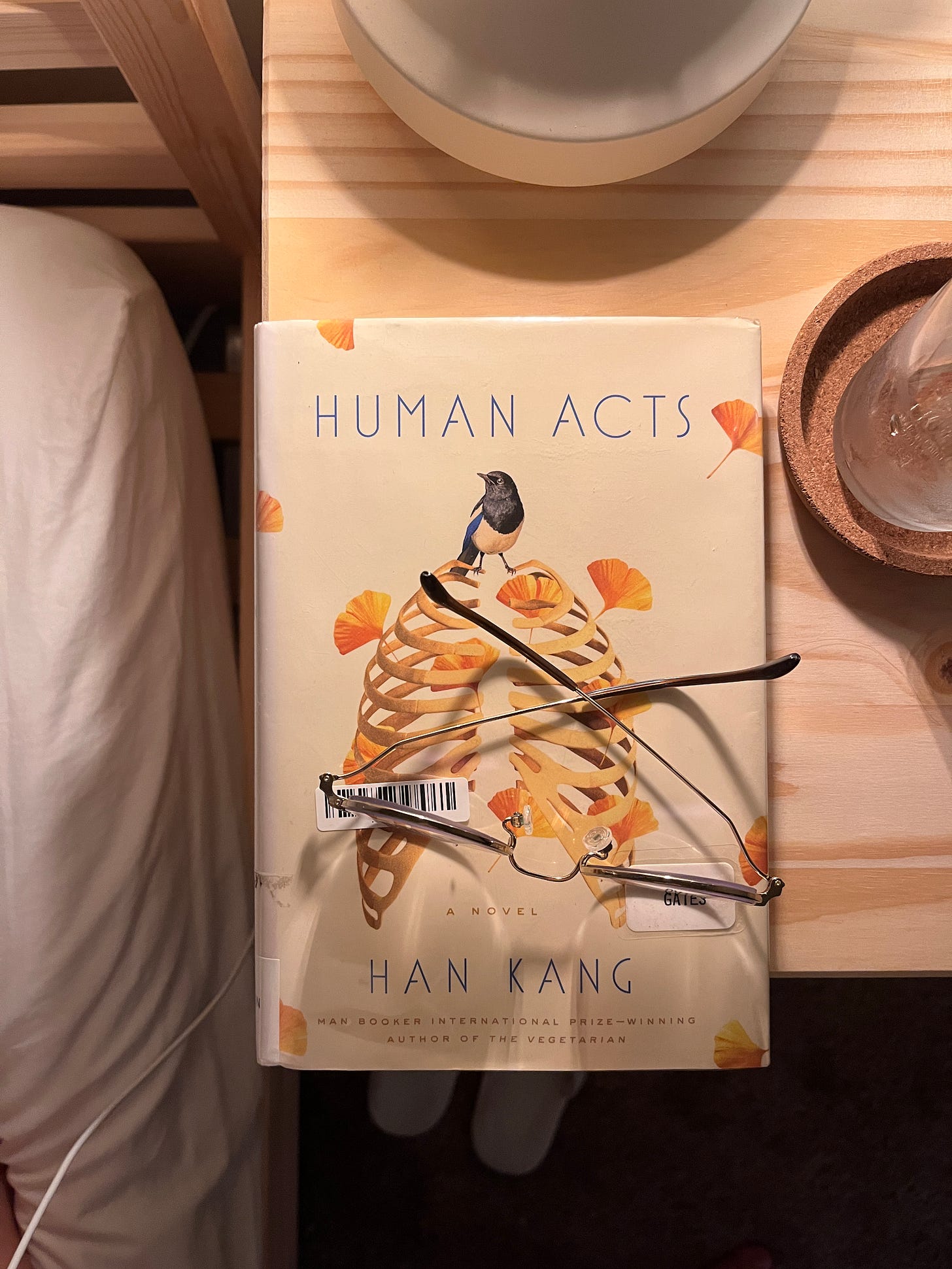
Lovely post Jin! I love the way you framed this post around the questions about the relationship between the living and the past. Need to reread Human Acts again!
I remember reading Human Acts right after the latest martial law incident and I thought to myself “I see why the Parliament acted so fast”. They remember. I also read somewhere in Human Acts that South Koreans can recognize a dictator when they see one. Or something to that effect. i forgot the exact words. That’s why literature is so important. So that people will remember. I love this book so much!